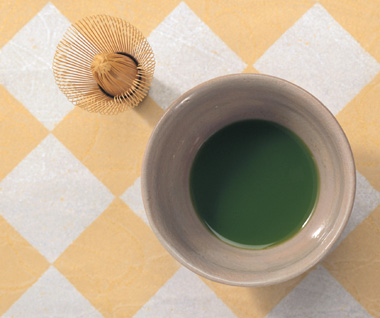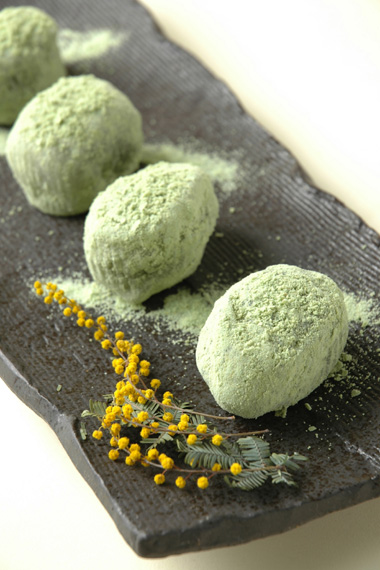
 |
Matcha
(pronounce: "MA-cha") also spelt maccha
(Japanese: 抹茶), is a fine, powdered green tea.
It is used in Japanese tea ceremony and for
dying and flavouring foods such as mochi and
soba noodles, green tea ice cream and different
types of wagashi (Japanese confectionery).
Matcha costs more money than other kinds of tea.
Its price depends on its quality (how good it
is). It can be hard to find outside Japan, and
also the special things that are used to make it
and drink it. |
Powdered tea, stored and traded
as tea bricks, seems to have been invented in
China during the Song Dynasty (960-1279). Making
and drinking powdered tea was formed into a
ritual (special ceremony) by the Chan Buddhists.
These Buddhists use to drink from the same bowl
as a sacrament.Chan Buddhism (also known in
Japanese as Zen), and powdered tea, were brought
to Japan in 1191 by the monk Eisai. Powdered tea
was slowly forgotten in China, but the 16th
century tea master Sen no Rikyu made the rules
of the Japanese tea ceremony. He said that
matcha was the correct tea to use.
Production
The preparation of matcha starts several weeks
before harvest. At that time, the tea bushes are
covered so that they do not get direct sunlight.
This makes it grow slower and turns the leaves a
darker shade of green. It also causes amino
acids to be made, and these make the tea taste
sweeter.
After harvesting, if the leaves are rolled out
before drying as usual, the result will be
gyokuro (jewel dew) tea. However, if the leaves
are laid out flat to dry, they will crumble and
become known as tencha (展茶). Tencha can then be
de-veined, de-stemmed, and ground (pressed) with
a stone until it becomes the fine, bright green,
talc-like powder known as matcha.
Only ground tencha can be called matcha: other
powdered teas are known as konacha (粉茶, lit.
"powdered tea").Nearly all the flavour of matcha
comes from the amino acids. The best matcha has
more sweetness and a deeper flavour than the
normal grades of tea harvested later in the
year.
 |
 |
|
|
 |
|





